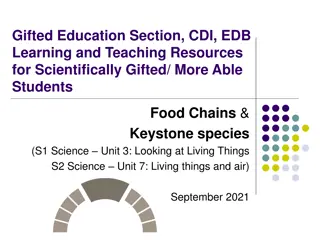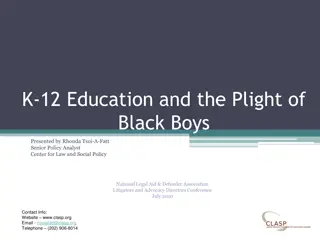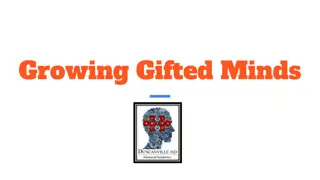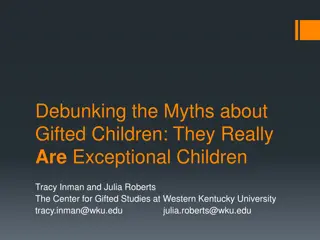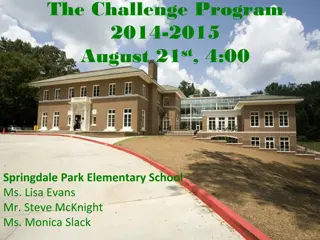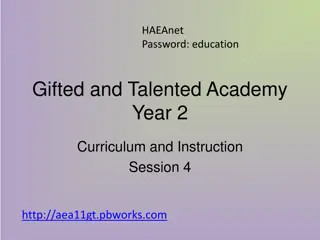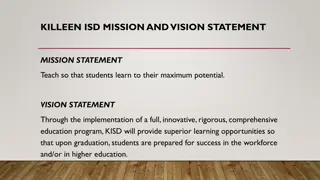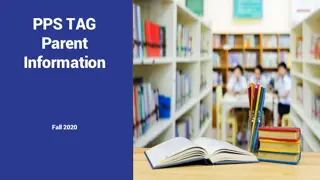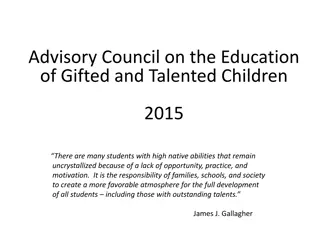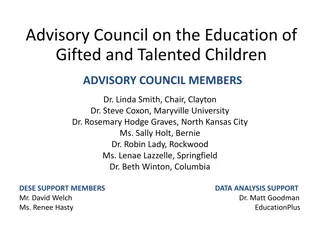
Supporting Gifted Children During COVID-19 Challenges
Discover insights on how the COVID-19 pandemic has affected gifted children and the strategies to help them navigate uncertainties, reignite curiosity, and manage mental health challenges. Learn from research findings and expert advice to set your gifted child up for success during these difficult times.
Download Presentation

Please find below an Image/Link to download the presentation.
The content on the website is provided AS IS for your information and personal use only. It may not be sold, licensed, or shared on other websites without obtaining consent from the author. If you encounter any issues during the download, it is possible that the publisher has removed the file from their server.
You are allowed to download the files provided on this website for personal or commercial use, subject to the condition that they are used lawfully. All files are the property of their respective owners.
The content on the website is provided AS IS for your information and personal use only. It may not be sold, licensed, or shared on other websites without obtaining consent from the author.
E N D
Presentation Transcript
COVID-19: What do our gifted kids need? Setting your child up for success Laurie Alisat, PhD June 10, 2021
Overview What have we learned from: the research the kids Concerns & strategies around: managing uncertainty re-igniting curiosity connecting to others going back to school Parent resources
What have we learned? Waddell, Schwartz, Barican, Yung & Gray-Grant, 2020 (SFU) Looked at pandemics & natural disasters over 70 years dramatic increase in anxiety, PTS, depression & behavioural challenges children with neuro-diverse special needs (ASD, FASD, developmental delays or other disabilities) greater mental health needs during pandemic 30% of children isolated or quarantined exceeded the clinical threshold for PTS symptoms, compared to 1.1% of children who did not have these experiences (prevalence of PTSD in the overall child population approx 0.1%)
What have we learned? Waddell, Schwartz, Barican, Yung & Gray-Grant, 2020 (SFU) parents with PTS symptoms meeting clinical threshold, 85.7% of their children did as well, compared to 14.3% of children whose parents did not mental health services use, higher for children isolated or quarantined children with generalized anxiety, adjustment difficulties, acute stress, PTS & grief protective factors: talking through problems with family or friends & teachers who conveyed reassurance
What have we learned? Waddell, Schwartz, Barican, Yung & Gray-Grant, 2020 (SFU) children with adversity pre-COVID, struggled more with anxiety, PTS & depression Kids Help Phone (24/7) reported 51% increase in texts & 70% increase in calls emerging literature warns of disparities of impact by SES; amplifies inequalities more severe negative effect on those with limited education, those exposed to illness, or those who could not work at home if a parent, stresses intensified for them & their children less advantaged children at greater risk for mental health concerns tenfold increases in needs for most affected children expected increase overall in childhood anxiety, depression, behavioural problems & PTS
What have we learned? Mactavish, Mastronardi, Menna, Babb, Battaglia, Amstadter, & Rappaport 2020 (UW) Studied 190 families, children 8-13 years, in S. Ontario worsened well-being and psychological distress during the pandemic reported all children higher depressive, anxiety (social & generalized) & ptsd symptoms 21+% experienced clinically significant levels, identified as a disorder on dsm v broad impact of pandemic on children s well-being child-perceived social support from family & friends associated with lower symptom severity
What have we learned? Solerdelcolla, Arangoc & Sugranyes, 2021 (UK & Spain) parents psychological distress reduced parenting skills lockdown challenging for children & adolescents, especially those with neuropsychiatric conditions or disabilities heightened risk when schools were closed, social services interrupted & movement restricted vulnerable to consequences of physical distancing coincides with sensitive period for onset of mental health problems peer interactions important for healthy brain & social development family & friendship disruptions, frustration, lack of personal space, reduced psychosocial support, inadequate information & family financial loss have detrimental effects on the development & wellbeing of children & adolescents
What have we learned? Solerdelcolla, Arangoc & Sugranyes, 2021 (UK & Spain) parents perceived a significant increase in children s emotional, behavioral & attentional difficulties high-stress home environments increased likelihood of family conflicts, emotional & behavioral problems, domestic abuse & violence negative impact of loneliness & social isolation disproportionately affects children from disadvantaged backgrounds
Emerging themes decreased well-being with isolation overall increase in incidence of behaviour concerns, anxiety, depression, PTS symptoms pre-existing conditions increased negative experiences parental wellness impacted child wellness & their relationship
What gifted kids are telling us
They are worried about COVID the spread of the virus variants their family and friends possible outcomes protocols vaccinations
The emotional impact on them anxiety depression unmotivated to learning unmotivated to engage in activities
The social impact on them unable to do regular activities unable to meet up with friends feelings of isolation lack of connection no place to belong
Worry: what will next year look like? school classes learning clubs & teams activities friends
How might we help our kids manage uncertainty? manage your own anxiety model calm & flexibility create/maintain routines & schedules give your child opportunities to make decisions & take action to keep the family safe
How might we help our kids manage uncertainty? acknowledge the uncertainty discuss what they have read or heard help them to make sense of the information they are receiving provide appropriate information identify things that are within their control (& not) & act on them
Be physically active Maybe easier said than done! find little ways to move make bigger plans feed the body, mind & soul with movement
Nourishment focus on eating tasty healthy foods resist temptation, make it special plan meals together, themed perhaps cook together
Healthy sleep routines preparing for sleep intentionally, quiet down ditch the technology screens temperature makes a difference, cool it!
How might we reignite curiosity in our kids? start with your child follow their lead what are they talking about, watching, doing be curious, what do you wonder about related to this? ask them to tell you more about it further explore this with them connect it to other things of interest add activity wherever possible
How might we help our kids connect with others? arrange for acceptable visits help others in your community yard work, food, decorations, messages
How might we prepare our kids for return to school? back to school rituals go to the school walk around the schoolyard organize school supplies choose clothes for the first day of school
Resources Alberta Health Services: Help in tough times CDC Parental Resources: Children and Young People s Social, Emotional, and Mental Health Montreal Children's Hospital: How to support kids mental health during the COVID - 19 pandemic SENG: Soothing the souls of our gifted learners University of Calgary: How to talk to your kids about COVID - 19 Wood s Homes Blog: Ideas to support your child and teen
Closing thoughts Take care of the basics Reassure with love & care Care for the caregiver Reach out as needed We ve got this! lauriealisatphd@gmail.com



